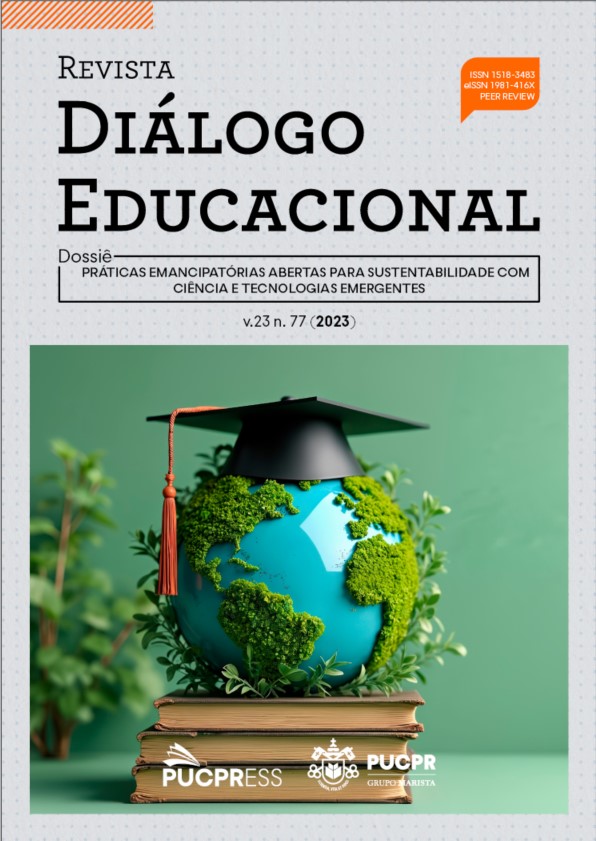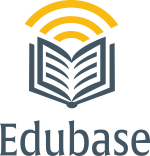Pedagogy of hypermobility:
formation, movement, connections, and communities integrated
DOI:
https://doi.org/10.7213/1981-416X.23.077.DS09Abstract
This scientific article presents the findings of doctoral research in Education, which aimed to explore the creation of pedagogical practices in the city-school-cyberspace relationship by teachers undergoing research-training in cyberculture, enabling the development of a pedagogy of hypermobility. The goal was to enable the development of a hypermobility pedagogy. The research was conducted with professors in continuing education who work in the Metropolitan Region of
Rio de Janeiro, within the courses offered by the Federal Institute of Rio de Janeiro. The methodology employed was
research-training in cyberculture, which combines teaching practice with research, and involves investigating the research construct and knowledge sharing with plural practitioners. Two research devices on hypermobility were developed during the field experience, to reflect on different research and training contexts, leading to the proposal of a concept
of hypermobility pedagogy. Through the investigation, seven subsuming notions emerged: problematizing existence that changes the world; interactive, inventive, and experiential education; education-world; education on the go; connected education; personalized and contextualized education; and hope for a new world. These concepts shed light on the pedagogical practices that teachers and researchers need to consider for a hypermobility pedagogy, allowing for moving experiences that are connected and related to their communities.
Downloads
References
ANDRADE, N.; CALDAS, A. N.; ALVES, N. Os movimentos necessários às pesquisas com os cotidianos – após muitas conversas acerca deles. In: OLIVEIRA, I. B.; PEIXOTO, L. F.; SÜSSEKIND, M. L. (Org.). Estudos do cotidiano, currículo
e formação docente: questões metodológicas, políticas e epistemológicas. 1 ed. Curitiba: CVR Editora, 2019, v. 1,
p. 19-45.
ARAUJO, D. O. Literatura infantil e ancestralidade africana: o que nos contam as crianças? Momento – Diálogos em Educação, [S. l.], v. 28, n. 1, p. 109-126, 2019. DOI: 10.14295/momento.v28i1.8774. Disponível em: https://periodicos.furg.br/momento/article/view/8774. Acesso em: 24 jan. 2021.
CERTEAU, M. de. A invenção do cotidiano: artes de fazer. Petrópolis: Vozes, 1994.
CERTEAU, M. de. História e psicanálise: entre ciência e ficção. Tradução Guilherme João de Freitas Teixeira. 2. ed. Belo Horizonte: Autêntica, 2012.
COUTO, E.; PORTO, C.; SANTOS, E. (Orgs.). App-learning: experiências de pesquisa e formação. 1ª ed. Salvador: EDUFBA, 2016.
FRANCO, M. A. R. S. Pedagogia como ciência da educação. 2. ed. rev. ampl. São Paulo: Cortez, 2008.
FREIRE, P. Extensão ou comunicação? Tradução Rosiska Darcy de Oliveira. Rio de Janeiro: Paz e Terra, 2013.
FREIRE, P. Pedagogia da autonomia: saberes necessários à prática educativa. São Paulo, SP: Paz e Terra, 2011.
FREIRE, P. Pedagogia da esperança: um reencontro com a Pedagogia do Oprimido – Notas: Ana Maria Araújo Freire. Rio de Janeiro: Paz e Terra, 2003
FREIRE, P. Pedagogia do oprimido. 17ª. ed. Rio de Janeiro: Paz e Terra, 1987.
GAUTHIER, C. et al. Por uma teoria da Pedagogia. Pesquisas contemporâneas sobre o saber docente. Ijuí-RS: Editora INIJUI, 2013.
JOSSO, M.-C. Experiências de vida e formação. São Paulo: Cortez, 2004.
LEMOS, A. Os sentidos da tecnologia: cibercultura e ciberdemocracia. In: LEMOS, A.; LÉVY, P. (Org). O futuro da internet: em direção a uma democracia planetária. São Paulo: Paulus, 2010.
LIBÂNEO, J. C. Ainda as perguntas: o que é pedagogia, quem é o pedagogo, o que deve ser o curso de Pedagogia. In:
PIMENTA, S. G. (org.). Pedagogia e pedagogos: caminhos e perspectivas. 3ª ed. São Paulo: Cortez, 2011.
MACEDO, R. S. Etnopesquisa crítica, etnopesquisa-formação. 2. ed. Brasília: Liber Livro Editora, 2010. 179 p. (Série Pesquisa, v. 15).
MARTINS, V. Formação de docentes para a educação online. 1. ed. v. 1. 65 p. Rio de Janeiro: Editora Uniedusul, 2021.
MARTINS, V.; CORREIA, A.-P.; SANTOS, E. Learning in Diverse Educational Contexts: Bringing Social Justice when Designing Culturally Rich Learning Experiences in Brazil. Journal of Applied Instructional Design, v. 10, p. 1-19, 2021.
MARTINS, V.; RIBEIRO, G. Paulo Freire e a educação-mundo: formação para a liberdade e a vivência na cidade. Revista Olhar de Professor, v. 23, p. 1-18, 2020.
OLIVEIRA, I. B.; ALVES, N. (org.). Pesquisa nos/dos/com os cotidianos das escolas. 3ª ed. Petrópolis: DP&A, 2008.
OLIVEIRA, I. B. Currículos praticados: entre a regulação e a emancipação. Rio de Janeiro: DP&A, 2003.
SANTAELLA, L. App-learning e a imaginação criativa a serviço da educação. In: COUTO, E.; PORTO, C.; SANTOS, E. (orgs.). App-learning: experiências de pesquisa e formação. 1ª ed. Salvador: EDUFBA, 2016.
SANTAELLA, L. Comunicação ubíqua: repercussões na cultura e na educação. São Paulo: Paulus, 2013.
SANTAELLA, L. Linguagens líquidas na era da mobilidade. São Paulo: Paulus, 2007.
SANTOS, E. A mobilidade cibercultural: cotidianos na interface educação e comunicação. Revista Em Aberto, Brasília, v. 28, n. 94, p. 134-145, jul./dez. 2015.
SANTOS, E. Pesquisa-formação na cibercultura. Teresina: EDUFPI, 2019.
SANTOS, R.; AMARAL, M. M. Ambiências formativas como espaçostempos de autorias no ensino superior. Educação em revista, v. 36, p. 1-21, 2020.
SILVA, M. A docência interativa e a pedagogia do parangolé. Revista Pluriverso, v. 1, p. 1, 2021.
SIMÕES, A. B.; MARTINS, V. Inovação na sala de aula: como a inovação disruptiva muda a forma de aprender. Teias (Rio de Janeiro), v. 20, p. 199-203, 2019.
TARDIF, M. Saberes docentes e formação profissional. 7. ed. Petrópolis: Editora Vozes, 2002.
Downloads
Published
How to Cite
Issue
Section
License
Copyright (c) 2023 Editora Universitária Champagnat

This work is licensed under a Creative Commons Attribution 4.0 International License.
O(s) autor(es) transfere(m), por meio de cessão, à EDITORA UNIVERSITÁRIA CHAMPAGNAT, pessoa jurídica de direito privado, inscrita no CNPJ/MF sob o n.º 76.659.820/0009-09, estabelecida na Rua Imaculada Conceição, n.º 1155, Prado Velho, CEP 80.215-901, na cidade de Curitiba/PR, os direitos abaixo especificados e se compromete a cumprir o que segue:
- Os autores afirmam que a obra/material é de sua autoria e assumem integral responsabilidade diante de terceiros, quer de natureza moral ou patrimonial, em razão de seu conteúdo, declarando, desde já, que a obra/material a ser entregue é original e não infringe quaisquer direitos de propriedade intelectual de terceiros.
- Os autores concordam em ceder de forma plena, total e definitiva os direitos patrimoniais da obra/material à EDITORA UNIVERSITÁRIA CHAMPAGNAT, a título gratuito e em caráter de exclusividade.
- A CESSIONÁRIA empregará a obra/material da forma como melhor lhe convier, de forma impressa e/ou on line, inclusive no site do periódico da EDITORA UNIVERSITÁRIA CHAMPAGNAT, podendo utilizar, fruir e dispor do mesmo, no todo ou em parte, para:
- Autorizar sua utilização por terceiros, como parte integrante de outras obras.
- Editar, gravar e imprimir, quantas vezes forem necessárias.
- Reproduzir em quantidades que julgar necessária, de forma tangível e intangível.
- Adaptar, modificar, condensar, resumir, reduzir, compilar, ampliar, alterar, mixar com outros conteúdos, incluir imagens, gráficos, objetos digitais, infográficos e hyperlinks, ilustrar, diagramar, fracionar, atualizar e realizar quaisquer outras transformações, sendo necessária a participação ou autorização expressa dos autores.
- Traduzir para qualquer idioma.
- Incluir em fonograma ou produção audiovisual.
- Distribuir.
- Distribuir mediante cabo, fibra ótica, satélite, ondas ou qualquer outro sistema que permite ao usuário realizar a seleção da obra ou produção para recebê-la em tempo e lugar previamente determinados por quem formula a demanda e nos casos em que o acesso às obras ou produções se faça por qualquer sistema que importe em pagamento pelo usuário.
- Incluir e armazenar em banco de dados, físico, digital ou virtual, inclusive nuvem.
- Comunicar direta e/ou indiretamente ao público.
- Incluir em base de dados, arquivar em formato impresso, armazenar em computador, inclusive em sistema de nuvem, microfilmar e as demais formas de arquivamento do gênero;
- Comercializar, divulgar, veicular, publicar etc.
- Quaisquer outras modalidades de utilização existentes ou que venham a ser inventadas.
- Os autores concordam em conceder a cessão dos direitos da primeira publicação (ineditismo) à revista, licenciada sob a CREATIVE COMMONS ATTRIBUTION LICENSE, que permite o compartilhamento do trabalho com reconhecimento da autoria.
- Os autores autorizam a reprodução e a citação de seu trabalho em repositórios institucionais, página pessoal, trabalhos científicos, dentre outros, desde que a fonte seja citada.
- A presente cessão é válida para todo o território nacional e para o exterior.
- Este termo entra em vigor na data de sua assinatura e é firmado pelas partes em caráter irrevogável e irretratável, obrigando definitivamente as partes e seus sucessores a qualquer título.
- O não aceite do artigo, pela EDITORA UNIVERSITÁRIA CHAMPAGNAT, tornará automaticamente sem efeito a presente declaração.













